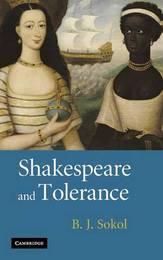
|
Shakespeare and Tolerance
Hardback
Main Details
| Title |
Shakespeare and Tolerance
|
| Authors and Contributors |
By (author) B. J. Sokol
|
| Physical Properties |
| Format:Hardback | | Pages:262 | | Dimensions(mm): Height 229,Width 152 |
|
| ISBN/Barcode |
9780521879125
|
| Classifications | Dewey:822.33 |
|---|
| Audience | | Postgraduate, Research & Scholarly | |
|---|
|
Publishing Details |
| Publisher |
Cambridge University Press
|
| Imprint |
Cambridge University Press
|
| Publication Date |
18 December 2008 |
| Publication Country |
United Kingdom
|
Description
Shakespeare's remarkable ability to detect and express important new currents and moods in his culture often led him to dramatise human interactions based on the presence or absence of tolerance. Differences of religion, gender, nationality and what is now called 'race' are important in most of Shakespeare's plays, and varied ways of bridging these differences by means of sympathy and understanding are often depicted. The full development of a tolerant society is still incomplete, and this study demonstrates how the perceptions Shakespeare showed in relation to its earlier development are still instructive and valuable today. Many recent studies of Shakespeare's work have focused on reflections of the oppression or containment of minority, deviant or non-dominant groups or outlooks. This book reverses that trend and examines how Shakespeare was fascinated by the desires that underlie tolerance, including religion, race and sexuality, through close analysis of many Shakespearian plays, passages and themes.
Author Biography
B. J. Sokol is Emeritus Professor of English at Goldsmith's College, University of London.
Reviews'Shakespeare and Tolerance makes an important intervention in an area of Shakespearian scholarship that should benefit from its freshness of approach; it can be recommended to anyone entering the stormy waters of Shakespeare and cultural difference ... it will be enjoyed by anyone with an interest in Shakespeare: Sokol is wonderfully attentive to the dynamics of character, and [the book] is studded with new and illuminating readings of familiar passages.' Modern Language Review
|